Book II, Chapter 2: The Stream
List of Chapters | Previous Chapter
A floorboard creaked overhead. Hermann’s eyes opened. He had been sleeping upright, back to the wall of the entryway of the farmhouse. He and Walter had constructed cushions out of the mattresses the Prussian soldiers had vandalized. The eiderdown quills that lay on the floors of the upper landing had been used as stuffing. The arrangement wasn’t comfortable, but it was better than lying on the stones between the drafty front and back doors.
The boy was still asleep, head resting on Hermann’s lap. Over the past two nights Hermann’s dreams had not been troubled by those terrible visions that he had suffered from in the days preceding his flight from the Schorn Foundation. This lamb of God at my side is keeping the werewolf at bay. But we will have to go our separate ways at some point. . . for his sake. It is my obligation to settle him in a place where he will be safe and can thrive.
There it was again. A footfall. It was doubtless the restless spirits of the Family Allard, who had been ignominiously murdered on their own farm. Hermann did not fear the dead so much as Satan and the mortals he manipulated. What Colonel Ludwig Landecker and his men had done would spiritually contaminate these precincts for generations to come. Why does the way of the wicked prosper? The Austrian Catholic was as perplexed as weeping Jeremiah by this question.
Hermann had devoted much of the first and second day to digging graves for each member of the family, including the man who had been hanged as a war criminal. There had been a spade left in the barn. He chose for the family’s resting place a grassy expanse to the east of the barn but within the perimiter wall. He buried them with their feet pointing east, so that on Judgment Day they would rise bodily to face the Throne of God. He placed a simple wooden cross at the head of each.
It was with some trepidation that Hermann removed the hanged man’s shirt, trousers and leather boots, so that he could wear these himself. The Prussian soldiers had not touched these items, since it was considered bad luck to wear a hanged man’s clothes. Hermann had beseeched God to forgive him for what he regarded as a necessitous act if he was to take the boy to safety.
Walter had found a few burlap bags containing biscuits that had been cast away by the soldiers, who had discovered far tastier fare on the farm. So the two of them gorged themselves on these (weevils and all), chasing each bite with a draught of water, since the tack was so dry that it galled the throat.
Hermann prayed over the graves for an hour at sundown, as Walter stepped outside and into the backyard carrying the empty apple basket. He placed it in the mud and sat beside it. The chicks that had not yet perished rushed to the boy, thinking he was there to feed them. Picking them up one at a time, Walter wrung their necks before tossing them in the basket.
The juxtaposition of the Tyrolean man praying for the Virgin to accept the murdered French family into her loving arms, as the German orphan dealt death to the same family’s chicks, never registered in the minds of either as an act of cruelty. Hermann’s views concerning animals were informed by Genesis in which God had granted Adam dominion over the beasts of the field.
Since it was autumn, they had covered the basket and kept it outside to keep the meat cool.
Hermann located a wooden mallet and mended the hinges of the front door as best he could to straiten the gaps in the doorframe to mitigate the force of the winds. Although they had devoured all of the biscuits and were famished again on that second night, they had been too weary to cook the meat. But they did not go to bed hungry.
Walter had stumbled upon the apple tree that had been the source of the rotting apples they had discovered in the house when they arrived. The apple tree stood at the farthest corner of the property on the outside of the perimeter wall. The tree had started bearing fruit in October.
On their last morning, Walter informed Hermann that, in the night when he had risen and stepped outside to answer a call of nature, he had heard a burbling of water emanating from a clump of trees on the other side of the field beyond the front gate. He asked if he could explore this, because, if there were a stream, there might be fish in it. Hermann gave him permission to go.
After Walter left, Hermann stepped out into the backyard and formed a pile of the movable items they would take with them. Although it would be clumsy, he could carry the iron spade, rake, and mattock over his shoulder. The iron in these were valuable and could be exchanged for money. There was a sickle, which Walter could carry. But the scythe would have to stay.
A grinding stone in the barn enabled him to sharpen his father’s straight-razor. While doing that, he noticed an old canvas hat on a peg and reasoned that its bucolic look might help alter his appearance. With the razor and mirror, he shaved off the flares of his mustaches but left much of the facial hair untouched, trimming only the scruff beneath his neck and ears. An overly groomed farmer in these parts made sense only if he was attending church or a wedding.
A cast-iron skillet and pronged fork had been left in the kitchen, as well as the iron hook over the hearth for holding pots and kettles. Hermann had tried to wrest the hook from the masonry it was embedded in, but without success. A box containing flint and steel for building fires had been discovered in a cupboard upstairs by the resourceful orphan.
When Walter returned, he reported that there was indeed a bach (stream) close by with rocks along its bank. It would be a good place to wash their clothes and cook a meal. But the water was shallow and he had seen no fish in it. He had searched unsuccessfully for wild berries, but had gathered a few mushrooms from a colony of them growing under some trees. He believed they were safe to eat.
“You’ve done well. We’ll take some of the chicks with us and build a fire by the stream. The smoke rising in the woods will be less conspicuous than were we to build a fire here.”
They spent the rest of that afternoon at the stream. The water was chilly and the air bracing, but it felt good to bathe, clean their clothes, and scour off the filth that their bodies had accumulated over the past few days.
A woodfire crackled on a broad flat rock close by. Hermann kept passing the dead man’s clothes over the smoke between washings in an effort to purge the faint odor of decay that had seeped into the fabric. He beat the clothes against the rocks and hung them over a branch to dry in the autumn air as best they could. They stayed close to the fire in their nakedness to keep warm. But there was plenty of kindling about, and, after the initial shock of the water’s frigidity, their bodies grew somewhat accustomed to briskness of the day.
Hermann stared for some time at the four küken (chicks) that he had laid out on the stone, because he was not sure how to cook them. He had never eaten chickens that young. Oma Ingrid had warned him that pork and poultry needed to be cooked through or a person could get sick and die from occult properties in the flesh. He bit off the chicks’ heads and spat them out, but left the downy coats on the bodies. Using the pronged fork as a skewer, he held each chick over the fire until the yellow bodies singed black and the sizzling fat split the skin.
They ate them whole, since the bones were not thick enough to splinter in their guts. It was not a good taste, but Hermann told Walter that they needed all of the strength that the food could give them, “including whatever virtues God has endowed their organs with. The reason you don’t like this is because it’s new.”
Walter put the charred remains of the one he had bitten into back on the rock. “I’ll eat mushrooms and apples,” he said.
Hermann devoured what Walter had refused to eat.
Once they had returned to the farm, the comparative warmth of the house’s interior had a soporific effect on them, and they decided to turn in early for this, their final night.
Hermann had refused to sleep lying down since their arrival. He yawned and sat down and rested his back against the wall. “We leave at daybreak.”
The floorboards creaked no more. The song of a thrush could be heard outside. The darkness in the house had begun to retreat. It was time. Gently, he shook Walter’s shoulder. The boy sat up and rubbed his eyes. Hermann rose and stretched. He gathered up the mattress cloth and tore strips from it so that he could lash together the three tools he would be carrying and keep them bundled tight together. He grabbed fistfuls of eiderdown and put his in his shoulder satchel, thinking a pillow-maker might buy the feathers.
Walter went out back and dumped most of the chicks’ carcasses into a shallow pit that Hermann had dug the previous day for that purpose. A dozen of the plumpest chicks had been set aside to barter with, since the meat had not yet gone bad. But after the previous day’s experience, Hermann wondered how popular küken were in the north.
Still yawning, Walter began filling the pit by kicking dirt into the hole, but Hermann told him to leave off doing that because they needed to get a move on. Walter put as many apples as he could carry in the same basket with the dozen chicks and tested the weight. He had to remove some of the apples, although he would have preferred to dump the chicks.
Hermann went to the barn momentarily and returned with the rope that the dead man had been hanged with. He made a sling for Walter to wear the sickle at his back, winding the hemp tight around the blade so that it would not pierce the boy’s shirt or cut into his skin.
The loose items, such as the pronged fork and the fire-building kit, were put in the tin pail that they had used to carry water from the well. Hermann could manage the pail with his free hand; and since it was made out of tin, it could be traded as well.
They would not travel the path that terminated in front of the property, since, if someone were to encounter them along the way, Hermann and Walter would not be able to hide that they had come from the Allard Farm. They decided to return to the stream and follow its trend north, so that they would have water and could build a fire and cook as they had done the previous day.
Walter led the way because Hermann did not want to exhaust the boy. They would march at the orphan’s pace. When they had reached the woods, Hermann turned one last time to look at the farmhouse on the other side of the grassy field. A candle burned in an upper window. May God have mercy on your souls, he prayed. At this, the guttering flame went out. Hermann plunged into the forest, as the doubtful light of dawn transitioned into the gloom under the trees that edged the stream.
After only a mile, the undergrowth on each bank became dense with briars. Hermann did not want to walk in the water and damage the boots, which were already coming apart at the seams.
Walter needed to rest. The basket was heavier than the boy had thought it would be. His face expressed frustration and he complained aloud that he was sorry for being weak.
“You’re not weak, Walter. But you should’ve taken meat yesterday. Leave what you can’t carry behind. I don’t know how long we’re going to be traveling this way. I’m not sure where the stream leads. I can carry the rope harness and sickle.”
“No. I’m fine.” The boy stood up again with a determined look on his face.
But within minutes, they perceived through the rising morning mist a stone bridge in the distance. “This is a good sign,” Hermann remarked.
They approached it from the east bank, staying out of the water as best they could. Hermann saw a figure standing at the edge of the stream close to the bridge.
“Walter, get behind me.”
The boy was too short to see over the thick dead tree that lay aslant the path.
The figure remained motionless. It wore a broad-brimmed hat.
“Servus!” Hermann shouted. Then he cursed beneath his breath for using a southern salutation. I have to be careful. Everyone at the workhouse knew I was Austrian.
Walter squinted and strained his eyes, but the withered vines clinging to the bark of the dead tree obstructed his view. But he bent down and could make out the legs of a man.
The figure touched the brim of his hat by way of greeting.
“My son and I are just passing through,” Hermann said. “I hope we didn’t startle you.”
There was no response.
Hermann tightened his grip on the tools over his shoulder. He stepped down into the water to circumvent the dead tree. Walter followed. When they had stepped back onto the bank, the boy heaved the basket against his chest, looked up and giggled.
A straw man stood at the water’s edge wearing a ragged coat and hat.
“I thought it was a man.”
Hermann licked his lips. “So did I.”
“Why is it here?”
“I don’t know, Walter.”
“It has a coat. You could wear that.”
“We’re not touching those things.” Hermann looked behind him to make sure no one had followed them. “This was probably put here by a madman or some hermit to keep people away. . . Come on.”
They climbed the embankment and crossed west over the bridge. Walter went to the edge of the bridge to look down at the straw man. Hermann shouted, “Don’t!”
Walter stopped and faced him. The exclamation had startled a four-legged animal beneath them that sprinted off across the water.
Hermann irritably motioned with his chin for the boy to keep walking over the bridge. “Sometimes, Walter, merely believing an object is imbued with evil is enough for the Devil to utilize it to his own dark ends.”
When they exited the woods the path broadened into a dirt road that stretched to a bleak horizon. Beneath an overcast sky, farms and modest dwellings lay on the brown hills and meadows.
They heard the clatter of wheels approaching. A long cart pulled by a yoke of oxen came from the gate of a large farm. The driver saw Hermann and Walter and stopped.
“Are you going to Kohlendorf?”
“Yes,” Hermann lied. He had traveled to Kohlendorf once for business, over a decade prior.
“You’re welcome to ride with us if you’d like. Climb in.”
The cart was filled with sheaves of wheat and baskets of potatoes, onions, and radishes. Seven girls sat in the back under the watchful eye of an ancient crone, who made it clear by her grimace that she expected the newcomers to conduct themselves like gentlemen.
Hermann laid the tools flush against the cart rails, taking care not to touch or incommode any of the young ladies. He told Walter to sit to his left so that the boy would be between himself and the plump attractive girl near the rear of the cart.
When they were settled in and the cart had begun to jostle and move, Hermann took the basket from Walter and spoke volubly, so that the driver could hear him as well. “We have apples and küken. Can we trade these for some of your vegetables?”
One of the girls addressed the old woman in a dialect of Flemish, since she apparently could not understand German. The woman grunted and made a sharp response. The middle-aged driver, who might have been her son, said something appeasing to her. The old woman extended both hands in Hermann’s direction.
“Oma wants to see the baby chicks,” the girl said. “We don’t need apples. Our neighbors have an orchard.”
The basket was passed to the old woman, who removed each chick and sniffed it to make sure it was not rotten. She looked at the girl, nodded, and mumbled something in a confidential tone.
“We can give you this sack of potatoes and that one over there of onions for the chicks.”
Hermann looked at the sacks, which were massive. “That’s too much. We can’t carry all that.” He licked his lips, not believing his luck. If she’s willing to offer that much for the chicks, then maybe I can get more for them in Kohlendorf.
“I’m afraid I can only part with five chicks.”
When this was translated to the old woman, she waved her hand over her nose to signify that the meat wasn’t as fresh as she had thought. Then she growled and said something that made her granddaughter blush and look away.
For some reason the woman’s behavior had awakened in Hermann’s mind an old memory; and he recalled that night long ago when he had tiptoed up the staircase of Tischler House, so that he could bid his children goodnight. Henrietta had been reading to Frank and Charlotte the story of the Fox and the Grapes from Aesop’s Fables.
Hermann pulled off his hat and covered his face with it, sobbing.
Everyone in the cart, including Walter, fell silent, embarrassed by this spontaneous and unmanly display of grief.
The wheels juddered over the rutted path until the driver detoured into a level field of tall weeds and withered grass. Two of the younger girls abruptly pointed to something behind Hermann. They began chattering animatedly in both Flemish and German about it.
One of the girls snickered and asked, “Why did they put that in a field of dead weeds?”
Hermann turned and looked over his right shoulder at the thing passing behind him on the other side of the cart rails. It was a scarecrow with a canine skull in lieu of a head. It wore a burlap hood; and the head clicked and wobbled in the faint morning breeze.
When Walter saw this, he grabbed Hermann’s hand and began to shake.
The old woman said something in Flemish, and the girl who had translated earlier interpreted. “Oma says that’s a wolf’s skull.”
“No it’s not,” the plump girl next to Walter interjected. “It’s a dog’s skull. There are no wolves in the Rhineland.”
“I’m just telling you what Oma said,” the translator remarked and shrugged.
The old woman stared at Hermann with a thin-lipped smile.

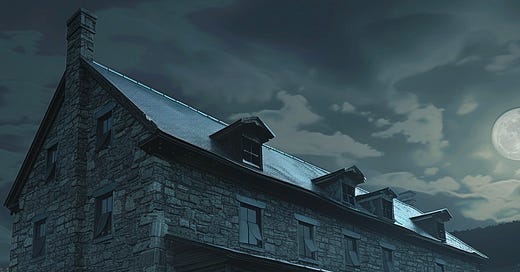




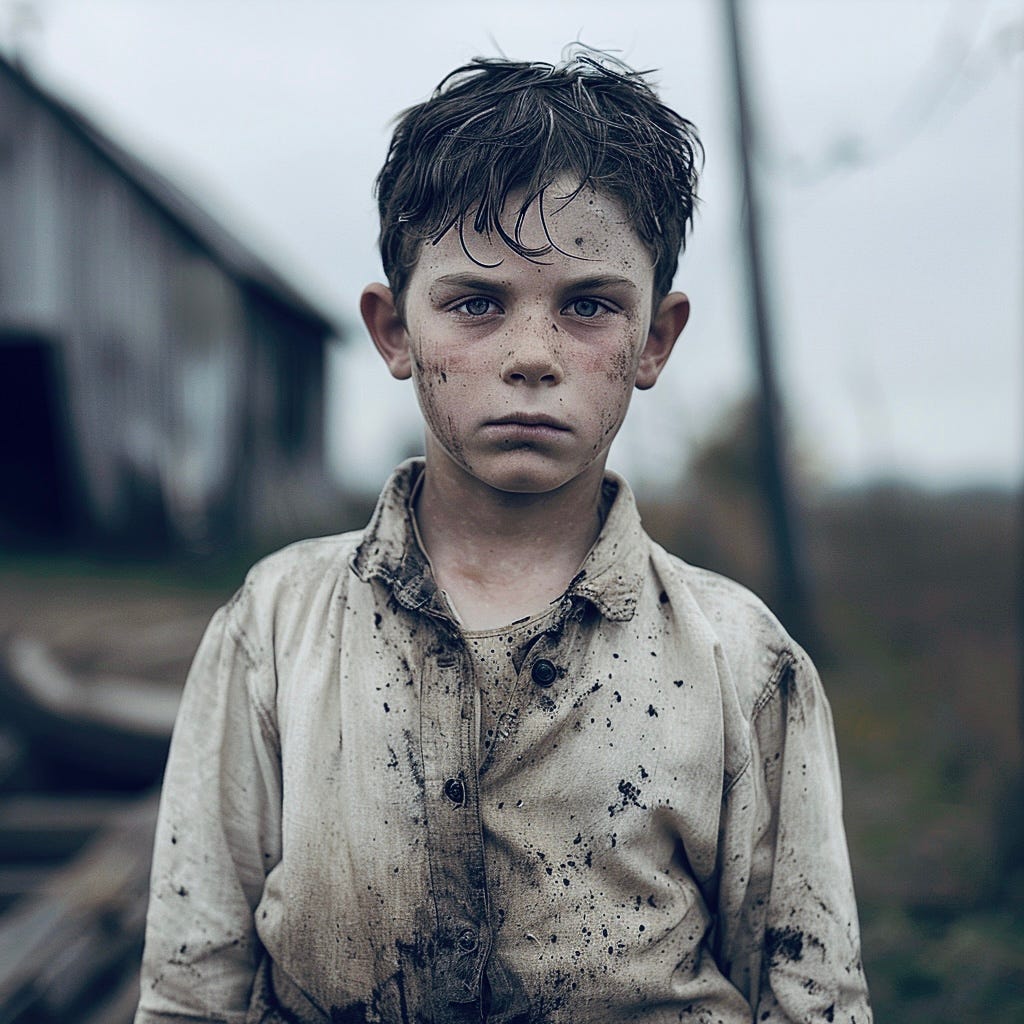
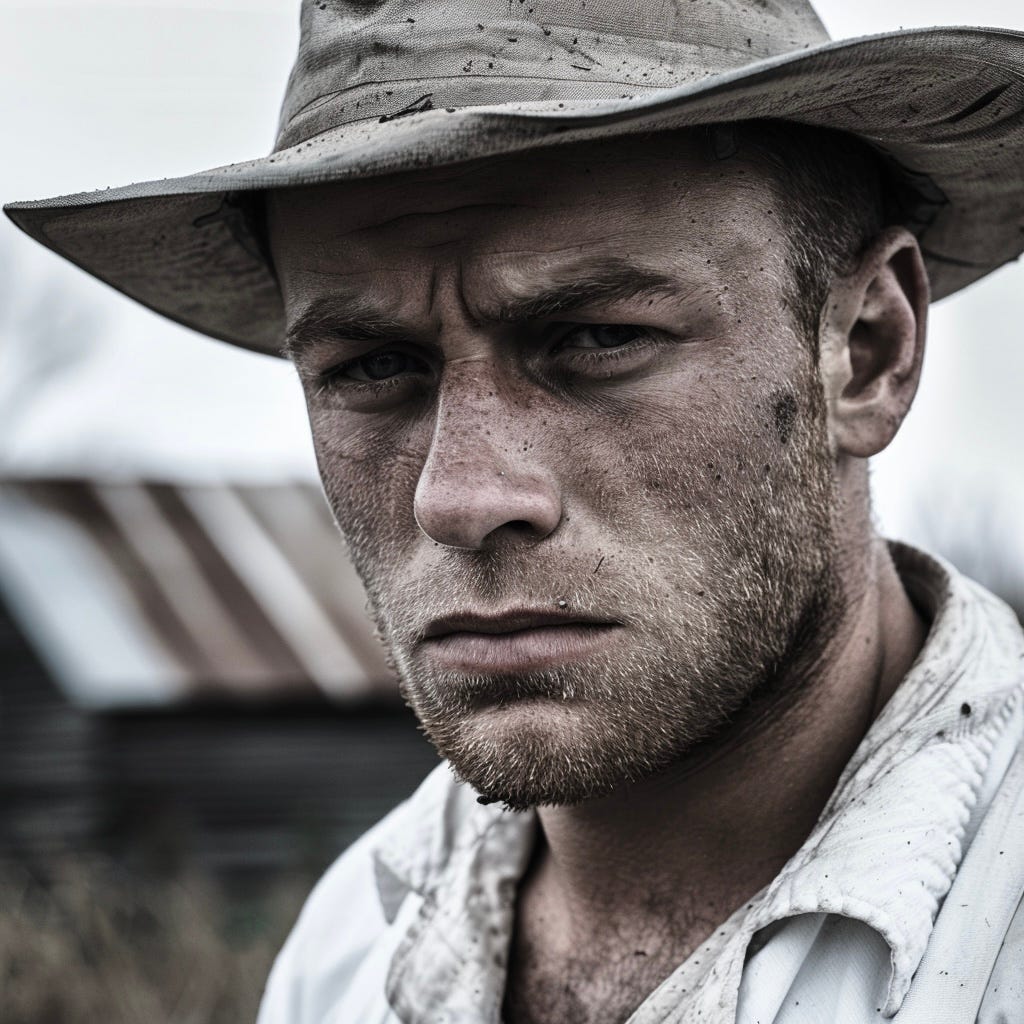


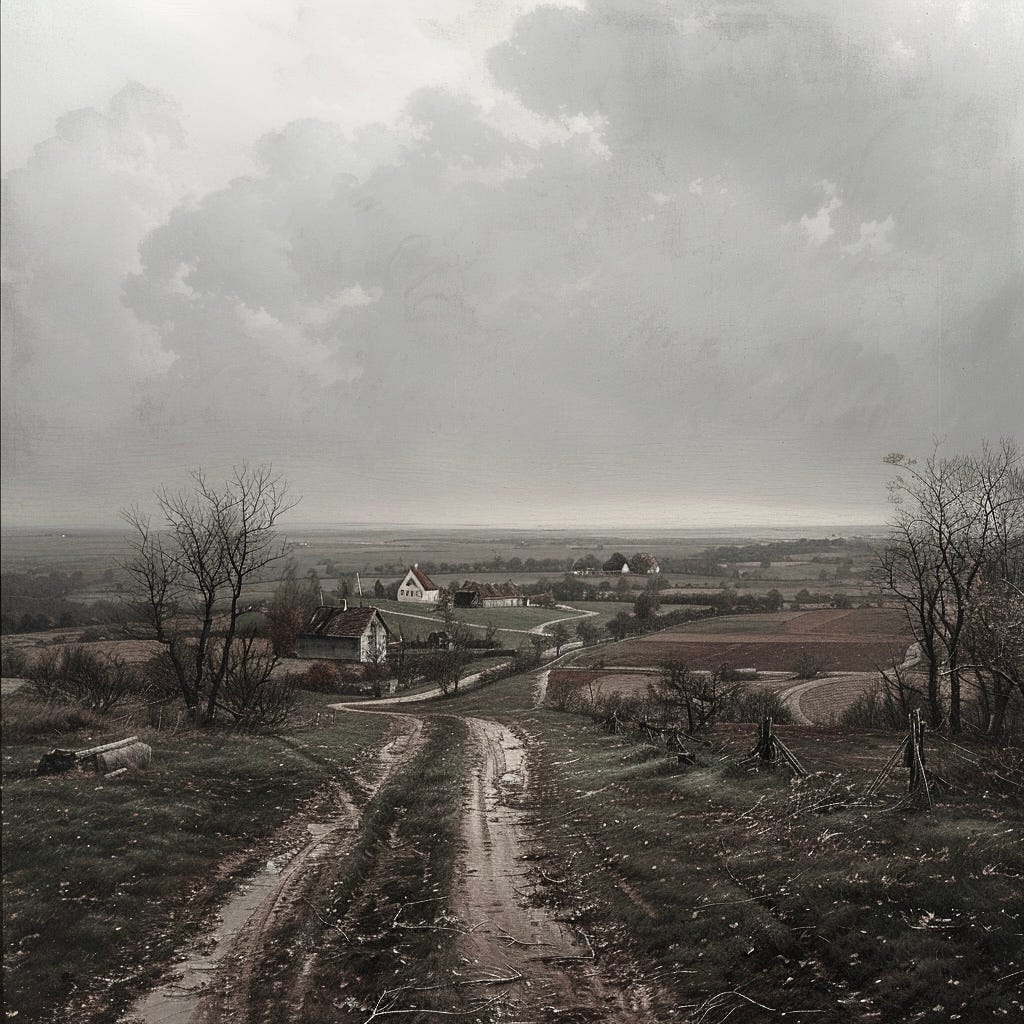
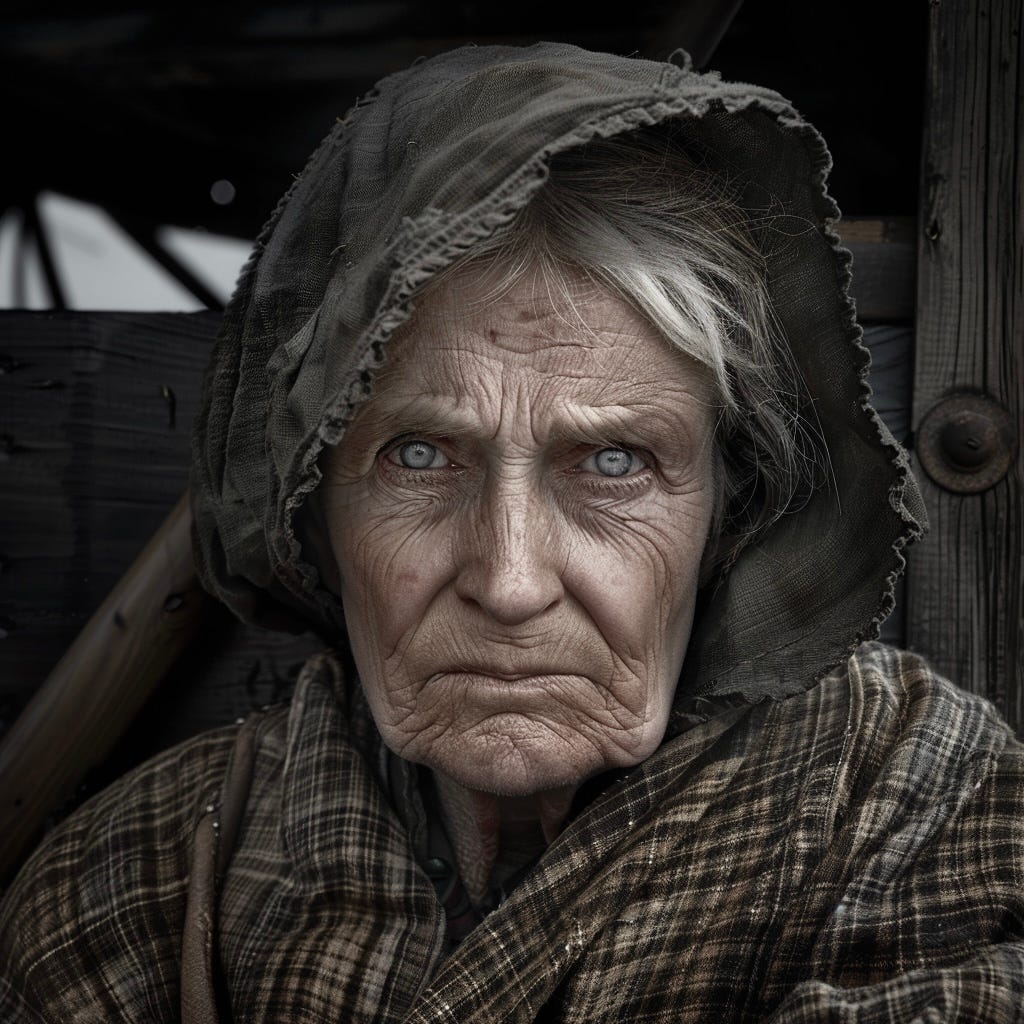

Daniel, this is a heartbreaking examination of how fraught Hermann and Walter's situation is. It was a godsend to find the farm to rest and prepare for the next leg of their journey, but a mind bending terror to see what happened to the family! I think Hermann is lucky in a way to have the responsibility for Walter to distract him from the constant expectation that the werewolf will reappear in some form. And of course he wants to find a safe haven for Walter before that happens. But now the odd scarecrow figures feel like a harbinger of ill fortune down the road! Wondering if the group of travelers are what they appear to be...
Man this story is so good. It reminds me of the feelings I had when reading The Jungle by Upton Sinclair, but coupled with the dread of reading Dracula or something similar.